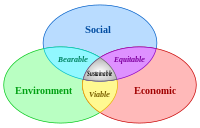
Photo from wikipedia
Abstract To tackle sustainability, firms often use partnerships with organizations from different industries or societal sectors such as government and civil society. While partnerships show potential for firms to improve… Click to show full abstract
Abstract To tackle sustainability, firms often use partnerships with organizations from different industries or societal sectors such as government and civil society. While partnerships show potential for firms to improve their sustainability performance, they not only lead to a potential to learn from diversity but also to tensions due to a lack of unity between partners. In partnerships for sustainability, this unity-diversity tension particularly manifests itself in different views of sustainability. This paper examines how this tension affects the sustainability performance of firms taking part in partnerships for sustainability in developing countries. To address this question, this tension is conceptualized as being the result of differences in organizational frames and institutional logics between a focal firm and other organizations in the partnership. It is also taken into consideration that firms are embedded in an overarching, relational network structure that allows them to manage the diversity in frames and logics. To test the hypotheses, the study analyses 1353 greenhouse gas emission reduction projects of 322 firms from developing countries active in the carbon-offset market from 2007 to 2009. The findings show that if partners hold different frames and belong to different sectors, a firm's sustainability performance improves first due to learning from diversity but after a turning point decreases from a lack of unity. This inverse U-shape relationship is flipped if a firm occupies a brokerage position in its network.
Journal Title: Long Range Planning
Year Published: 2019
Link to full text (if available)
Share on Social Media: Sign Up to like & get
recommendations!